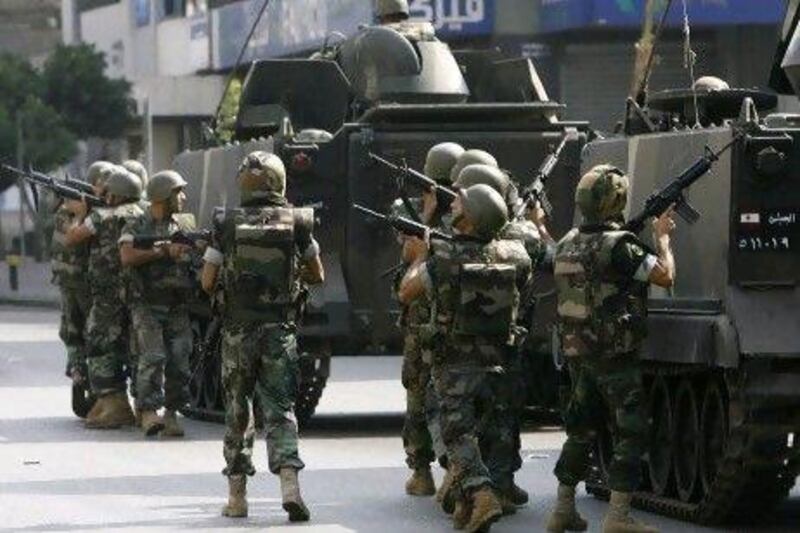BEIRUT // Lebanese troops launched a major security operation yesterday, trying to contain sectarian outbursts of violence triggered by the assassination of a top intelligence official who was a powerful opponent of Syria.
The regime in Damascus has been blamed by opponents of Syria for the killing Friday of Lebanese Brig-Gen Wissam Al Hassan and the wounding of more than 100 in a Beirut car bomb.
With Lebanon already tense and deeply divided over the civil war next door, the assassination has threatened to drag the country back into the kind of sectarian strife that plagued it for decades.
"The nation is passing through a crucial and critical period and tension has risen in some areas to unprecedented levels," the Lebanese army said in a statement.
"Security is a red line," the statement continued, adding that strict measures are being taken to "prevent Lebanon from being an arena for settling regional problems."
At least six people were killed in sectarian clashes, according to news reports.
Throughout the day sporadic gunfire was heard in southwestern Beirut as soldiers and armoured personnel carriers with heavy machine guns took up position on major thoroughfares cutting off main roads between Sunni and Shiite neighbourhoods. The state news agency also reported sporadic gunfire in around the northern city of Tripoli.
Lebanon and Syria share similar divides that have fed tensions in both countries. Most of Lebanon's Sunnis have backed Syria's mainly Sunni rebels, while Lebanese Shiites tend to back Syria's president Bashar Al Assad who belongs to the minority Alawite sect - an offshoot of Shiite Islam.
In Tripoli, residents said scores of soldiers were deployed around the city in an attempt to bring back calm.
The military had set up checkpoints, searched cars and asked people for identity cards. At least six people were killed in the fighting between the Sunni neighbourhood of Bab Tabbaneh and the adjacent Alawite neighbourhood of Jabal Mohsen, which supports the Syrian regime.
In Beirut, the army said soldiers killed one gunman in Tariq Al Jadida, a Sunni district that abuts Shiite suburbs in the south of the capital.
"My family and I had to escape because of the heavy shooting at 2am," said Abbas who lives in a predominantly Shiite and Druze neighbourhood. "The gunmen approached the neighbourhood and were fended off by the army. Some residents also shot back at them," he said.
The spiral of events come after an attempt on Sunday by protesters to storm the Serail, the government headquarters, to unseat prime minister Najib Mikati, whom they blame for the assassination of Al Hassan.
But they were pushed back by troops who fired their guns in the air and filled the street with tear gas.
Dozens of college students gathered yesterday at the site of the bomb blast, carrying Lebanese flags and singing the national anthem.
"We wanted to honour them with a moment of silence. They didn't deserve to die," said Samantha, 20.
While Syrian opposition flags were prominent in Sunday's mass demonstration and flew over the pitched tents, they were notably taken down today after criticism that they were bringing the conflict in Syria to Lebanese soil.
"No Lebanese would storm the Serail. Those people in the tents aren't Lebanese," said Abu Ali, 60, who works in the area. "They are bringing foreign problems to us. We may be of different sects, but we live and die together."
By dusk, the army said military operations were successful and things were back to "normal" in the city. Despite the uneasy calm, sectarian distrust between Lebanon's Sunni and Shiite communities pulsed.
"There is a deep anger and hatred I didn't expect. I was shocked," said Abu Raad, a resident of the Musseytbeh neighbourhood, who also fled his home Sunday night.
"There is no more hope in this country," said Mohamed, 85, sitting outside his empty hardware shop close to the motorway blocked off by the army. "I have seen World War Two. I have seen the civil war. All I can say is God help us."
[ foreign.desk@thenational.ae ]
* With additional reports from the Associated Press and Agence France-Presse





